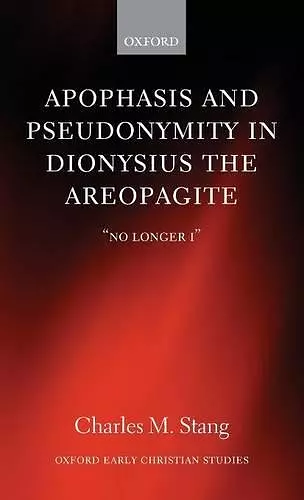Apophasis and Pseudonymity in Dionysius the Areopagite
"No Longer I"
Format:Hardback
Publisher:Oxford University Press
Published:9th Feb '12
Currently unavailable, and unfortunately no date known when it will be back

Part of the OAPEN-UK project
This book examines the writings of an early sixth-century Christian mystical theologian who wrote under the name of a convert of the apostle Paul, Dionysius the Areopagite, and argues that the pseudonym and the corresponding influence of Paul are the crucial lens through which to read this influential corpus.This is an open access title available under the terms of a CC BY-NC-ND 3.0 International licence. It is free to read at Oxford Scholarship Online and offered as a free PDF download from OUP and selected open access locations. This book examines the writings of an early sixth-century Christian mystical theologian who wrote under the name of a convert of the apostle Paul, Dionysius the Areopagite. This 'Pseudo'-Dionysius is famous for articulating a mystical theology in two parts: a sacramental and liturgical mysticism embedded in the context of celestial and ecclesiastical hierarchies, and an austere, contemplative regimen in which one progressively negates the divine names in hopes of soliciting union with the 'unknown God' or 'God beyond being.' Charles M. Stang argues that the pseudonym and the influence of Paul together constitute the best interpretive lens for understanding the Corpus Dionysiacum [CD]. Stang demonstrates how Paul animates the entire corpus, and shows that the influence of Paul illuminates such central themes of the CD as hierarchy, theurgy, deification, Christology, affirmation (kataphasis) and negation (apophasis), dissimilar similarities, and unknowing. Most importantly, Paul serves as a fulcrum for the expression of a new theological anthropology, an 'apophatic anthropology.' Dionysius figures Paul as the premier apostolic witness to this apophatic anthropology, as the ecstatic lover of the divine who confesses to the rupture of his self and the indwelling of the divine in Gal 2:20: 'it is no longer I who live, but Christ who lives in me.' Building on this notion of apophatic anthropology, the book forwards an explanation for why this sixth-century author chose to write under an apostolic pseudonym. Stang argues that the very practice of pseudonymous writing itself serves as an ecstatic devotional exercise whereby the writer becomes split in two and thereby open to the indwelling of the divine. Pseudonymity is on this interpretation integral and internal to the aims of the wider mystical enterprise. Thus this book aims to question the distinction between...
Like the best books, once one follows Stang in his exploration of Dionysios, it all seems so obvious. * Andrew Louth, Theology *
The great merit of Charles Stang is to have filled a gap in Dionysian studies. * Gioacchino Curiello, Ecclesiastical History. Vol. 64.2 *
ISBN: 9780199640423
Dimensions: 221mm x 147mm x 21mm
Weight: 442g
246 pages